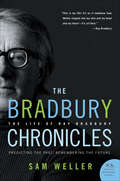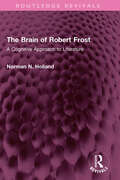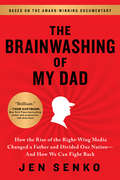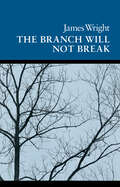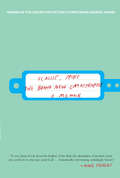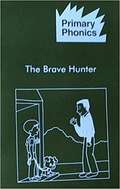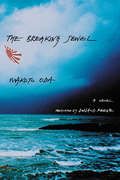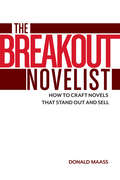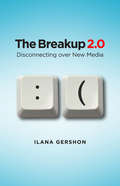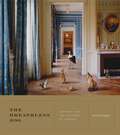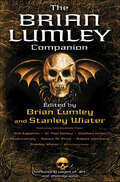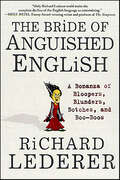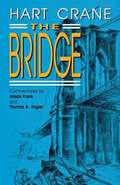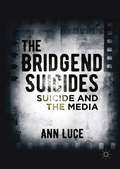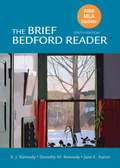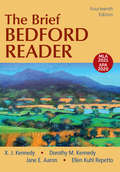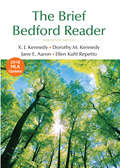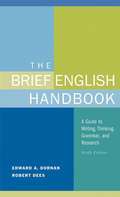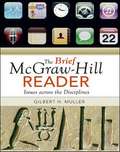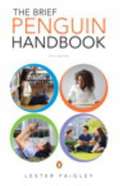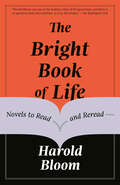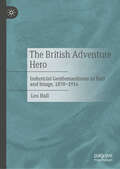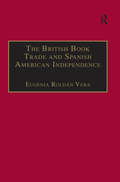- Table View
- List View
The Bradbury Chronicles: The Life of Ray Bradbury
by Sam Weller“For Bradbury fans, THE BRADBURY CHRONICLES is essential. . . . [A]n engaging, often fascinating tale.” — New York Times Book Review“A fascinating look at a man’s work -- and the incredible evolution of an alien subgenre.” — Chicago Tribune “A highly readable story . . . informative, enjoyable, and inspiring.” — School Library Journal
The Brain of Robert Frost: A Cognitive Approach to Literature (Routledge Revivals)
by Norman N. HollandOriginally published in 1988, this book brings brain science to literary criticism. The Brain of Robert Frost combines psychoanalysis with the findings of brain research and cognitive psychology to model the way we create and respond to literature. Norman Holland draws three central ideas from ‘the mind’s new science’: the critical ‘supercharged’ period in infancy when individuality is formed; the binding of emotion to intellect deep in the old brain; the top-down, inside-out, feedback processing of language in the new. Then, using Robert Frost as an example both of a writer and a reader, and comparing Frost’s reading of a poem to readings by six professors of literature, Holland builds a new, powerful way of thinking about literary criticism and teaching. A book about literary cognition, The Brain of Robert Frost furthers our understanding of the reading process, of poet’s brains, and of our own.
The Brainwashing of My Dad: How the Rise of the Right-Wing Media Changed a Father and Divided Our Nation—And How We Can Fight Back
by Jen SenkoAfter her beloved dad got addicted to right-wing talk radio and Fox News, Jen Senko feared he would never be the same again…Frank Senko had always known how to have a good time. Despite growing up in a poverty-stricken family during the Depression and having to fight his way to middle-class status as an adult, he tended to look on the bright side. But after a job change forced Frank to begin a long car commute every day, his daughter Jen noticed changes in his personality and beliefs. Long hours on the road listening to talk radio commentators like Rush Limbaugh sucked her father into a suspicion-laden worldview dominated by conspiracy theories, fake news, and rants about the "coastal elite" and "libtards" trying to destroy America.Over the course of a few years, Jen's dad went from a nonpolitical, open-minded Democrat to a radical, angry, and intolerant right-wing devotee who became a stranger to those closest to him. As politics began to take precedence over everything else in her father's life, Jen was mystified. What happened to her dad? Was there anything she could do to help? And, most importantly, would he ever be his lovable self again? Jen began the search for answers, and found them... as well stories from countless other families like her own.Based on the award-winning documentary, The Brainwashing of My Dad uncovers the alarming right-wing strategy to wield the media as a weapon against our very democracy. Jen's story shows us how Fox News and other ultra-conservative media outlets are reshaping the way millions of Americans view the world, and encourages us to fight back.
The Branch Will Not Break: Poems (Wesleyan Poetry Program)
by James WrightA new book of poetry from a Pulitzer Prize-winning master poet These new poems by the author of Saint Judas and The Green Wall embody a sharp break with his earlier work. Their impact is well described by the British critic Michael Hamburger: "He has absorbed the work of modern Spanish and other continental poets and evolved a medium of his own. This medium dispenses with argument and rhetoric, and presents the pure substance of poetry, images which are 'the objective correlatives' of emotion and feeling. It is only in the new collection that Wright has found this wholly distinctive voice." Mr. Wright is well known for his previous books and his contributions to virtually every literary journal of importance. His numerous honors include a Fullbright fellowship, a Kenyon Review fellowship, and many other prizes and awards.
The Brand New Catastrophe: A Memoir
by Mike ScaliseWinner of the Center for Fiction's Doheny Prize Raucous family memoir meets medical adventure in this heartfelt, hilarious book exploring the public and private theaters of illness. After a tumor bursts in Mike Scalise’s brain, leaving him with a hole in the head and malfunctioning hormones, he must navigate a new, alien world of illness maintenance. His mother, who has a chronic heart condition and a flair for drama, becomes a complicated model as she competes with him for the status of "best sick person. "The Brand New Catastrophe is a moving, funny exploration of how we define ourselves by the stories we choose to tell. Mike Scalise's work has appeared inThe New York Times, The Wall Street Journal, Agni, Indiewire, The Paris Review Daily, and elsewhere. He has received fellowships and scholarships from Bread Loaf, Yaddo, the Ucross Foundation, and was the Philip Roth Writer in Residence at Bucknell University. He lives in Brooklyn, New York.
The Brave Hunter (Primary Phonics #Set 4 Book 8)
by Barbara W. MakarA systematic, phonics-based early reading program that includes: the most practice for every skill, decodable readers for every skill, and reinforcement materials--help struggling students succeed in the regular classroom <P><P>Primary Phonics, Set 4, Book 8
The Breaking Jewel: A Novel (Weatherhead Books on Asia)
by Makoto OdaSet on an island in the South Pacific during the final days of World War II, when the tide has turned against Japan and the war has unmistakably become one of attrition, The Breaking Jewel offers a rare depiction of the Pacific War from the Japanese side and captures the essence of Japan's doomed imperial aims. The novel opens as a small force of Japanese soldiers prepares to defend a tiny and ultimately insignificant island from a full-scale assault by American forces. Its story centers on squad leader Nakamura, who resists the Americans to the end, as he and his comrades grapple with the idea of gyokusai (translated as "the breaking jewel" or the "pulverization of the gem"), the patriotic act of mass suicide in defense of the homeland. Well known for his antiestablishment and antiwar sentiments, Makuto Oda gradually and subtly develops a powerful critique of the war and the racialist imperial aims that proved Japan's undoing.
The Breakout Novelist: How to Craft Novels That Stand Out and Sell
by Donald MaassIntended as a reference for writers in need of help with a stall, breakdown or block, this spiral bound, hard cover guide presents practical advice for novelists in all aspects of their writing and career. Drawn from the authors previous works Writing the Breakout Novel, Writing the Breakout Novel Workbook, The Fire in Fiction and The Career Novelist, this volume covers the basics of story development such as characters, plot and pace, processes for improving manuscripts such as writing characters that matter to readers and finding a unique voice, and advice on publishing and career management including information on pitching projects, hiring agents and contracts. Numerous writing exercises are included throughout. Maass is a literary agent in New York City. Annotation ©2011 Book News, Inc. , Portland, OR (booknews. com)
The Breakup 2.0: Disconnecting over New Media
by Ilana GershonA few generations ago, college students showed their romantic commitments by exchanging special objects: rings, pins, varsity letter jackets. Pins and rings were handy, telling everyone in local communities that you were spoken for, and when you broke up, the absence of a ring let everyone know you were available again. Is being Facebook official really more complicated, or are status updates just a new version of these old tokens? Many people are now fascinated by how new media has affected the intricacies of relationships and their dissolution. People often talk about Facebook and Twitter as platforms that have led to a seismic shift in transparency and (over)sharing. What are the new rules for breaking up? These rules are argued over and mocked in venues from the New York Times to lamebook. com, but well-thought-out and informed considerations of the topic are rare. Ilana Gershon was intrigued by the degree to which her students used new media to communicate important romantic information-such as "it's over. " She decided to get to the bottom of the matter by interviewing seventy-two people about how they use Skype, texting, voice mail, instant messaging, Facebook, and cream stationery to end relationships. She opens up the world of romance as it is conducted in a digital milieu, offering insights into the ways in which different media influence behavior, beliefs, and social mores. Above all, this full-fledged ethnography of Facebook and other new tools is about technology and communication, but it also tells the reader a great deal about what college students expect from each other when breaking up-and from their friends who are the spectators or witnesses to the ebb and flow of their relationships. The Breakup 2. 0 is accessible and riveting.
The Breathless Zoo: Taxidermy and the Cultures of Longing (Animalibus)
by Rachel PoliquinFrom sixteenth-century cabinets of wonders to contemporary animal art, The Breathless Zoo: Taxidermy and the Cultures of Longing examines the cultural and poetic history of preserving animals in lively postures. But why would anyone want to preserve an animal, and what is this animal-thing now? Rachel Poliquin suggests that taxidermy is entwined with the enduring human longing to find meaning with and within the natural world. Her study draws out the longings at the heart of taxidermy—the longing for wonder, beauty, spectacle, order, narrative, allegory, and remembrance. In so doing, The Breathless Zoo explores the animal spectacles desired by particular communities, human assumptions of superiority, the yearnings for hidden truths within animal form, and the loneliness and longing that haunt our strange human existence, being both within and apart from nature.
The Breathless Zoo: Taxidermy and the Cultures of Longing (Animalibus: Of Animals and Cultures #1)
by Rachel PoliquinFrom sixteenth-century cabinets of wonders to contemporary animal art, The Breathless Zoo: Taxidermy and the Cultures of Longing examines the cultural and poetic history of preserving animals in lively postures. But why would anyone want to preserve an animal, and what is this animal-thing now? Rachel Poliquin suggests that taxidermy is entwined with the enduring human longing to find meaning with and within the natural world. Her study draws out the longings at the heart of taxidermy—the longing for wonder, beauty, spectacle, order, narrative, allegory, and remembrance. In so doing, The Breathless Zoo explores the animal spectacles desired by particular communities, human assumptions of superiority, the yearnings for hidden truths within animal form, and the loneliness and longing that haunt our strange human existence, being both within and apart from nature.
The Brian Lumley Companion
by Stanley WiaterEdited by Brian Lumley and multiple Bram Stoker Award winner Stanley Wiater, The Brian Lumley Companion is an indispensable guide to the life and works of Brian Lumley. The Companion is illustrated with photographs from the author's private collection and full-color reproductions of Hugo Award–winning artist Bob Eggleton's eye-catching cover art for Lumley's works. Contributors to The Brian Lumley Companion include some of today's most noted experts on horror fiction, including W. Paul Ganley, founder of Weirdbook Press and two-time winner of the World Fantasy Award; Stephen Jones, coeditor of Horror: 100 Best Books and winner of multiple World Fantasy, British Fantasy, and Bram Stoker Awards; Robert M. Price, author of H. P. Lovecraft and the Cthulhu Mythos and one of the most respected analysts of Lovecraftian fiction; Robert G. Weinberg, an acknowledged specialist in weird fiction, and Stanley Wiater, host of the TV series "Dark Dreamers." In The Brian Lumley Companion, Lumley aficionados will find an overview of Lumley's career, from his first short fiction up to the present day; essays comparing Lumley and H. P. Lovecraft, a lengthy interview with the author that delves into the heart of Lumley's relationship with the writers and editors who inspired him and the fans who support him, and analyses of Lumley's short fiction and novels. An interview with Bob Eggleton gives insight into the development of his striking covers for the Necroscope series and other Lumley works. This companion also includes complete listings of the first publications of each of Lumley's novels, short fiction, and poetry. Major attractions are the detailed concordances that focus on individual novels and series, including the three Psychomech titles, the Dreamlands and Primal Lands series, and each volume in the Necroscope series. As a special treat, The Brian Lumley Companion includes three short short stories by Brian Lumley, works that have never before appeared in book form.
The Bride of Anguished English: A Bonanza of Bloopers, Blunders, Botches, and Boo-Boos
by Richard LedererFor years wordsmith and punster Richard Lederer has charmed and delighted fans with his bestselling "Anguished English" series. In his funniest book yet, readers will again cherish the author's latest chronicle of the goofs and gaffes and fluffs and flubs of our anguished language. And the best part? Everything in here actually occurred! Nothing has been made up!Bloopers from foreign restaurants include: * "Our wines leave you nothing to hope for."* "As for the tripe served here, you will be singing its praises to your grandchildren on your deathbed."Excerpts from students' twisted history papers include:* "World War I made the people so sad that it brought on the Great Depression."* "America was founded by four fathers. Delegates from the original 13 states formed the Contented Congress. Thomas Jefferson, a Virgin, and Benjamin Franklin were two singers of the Decoration of Independence, which says that all men are cremated equal and are well endowed by their creator."Hilarious illustrations by Jim McLean make The Bride of Anguished English the perfect book for anyone who loves English with all its blunders and bloopers and quips and quirks.
The Bridge
by Hart CraneBegun in 1923 and published 1930, The Bridge is Crane's major work. "Very roughly," he wrote a friend, "it concerns a mystical synthesis of 'America' ... The initial impulses of 'our people' will have to be gathered up toward the climax of the bridge, symbol of our constructive future, our unique identity."
The Bridgend Suicides
by Ann LuceThis in depth analysis looks at how suicide was represented in the British press when 20 young people between the ages of 15 and 29 took their own lives in the South Wales Borough of Bridgend in 2008. The chapters highlight specific categories of description that journalists use to explain suicide to their readers. The study also examines the discourses that emerged around suicide that continue to perpetuate stigma and shame when suicide occurs today. Using her own experience of having lost a loved one to suicide, coupled with original research, the author gives a very frank explanation of why suicide is not accepted in society today.
The Brief Bedford Reader (Tenth Edition)
by X. J. Kennedy Dorothy M. Kennedy Jane E. AaronA compact version of one of the most widely adopted composition readers of all time "The Brief Bedford Reader" continues to engage and inspire with 50 remarkable selections, all the outstanding instructional material of the full-length text, and a unique "Writers on Writing" feature in which 32 of the book's writers comment on their process and their work. Thorough coverage of critical reading, effective writing, and working with sources guides students, now more than ever, through their own academic writing. And an exciting visual dimension shows that rhetorical methods apply to both images and text. "The Brief Bedford Reader" is a favorite of students for the Kennedys' clarity and wit, of instructors for the flexible and realistic view of the rhetorical methods, and of both for the superior selections and perceptive commentaries by writers worth reading.
The Brief Bedford Reader with 2020 APA and 2021 MLA Updates
by Dorothy M. Kennedy Jane E. Aaron Ellen Kuhl Repetto X. J. KennedyThis ebook has been updated to provide you with the latest guidance on documenting sources in MLA style and follows the guidelines set forth in the MLA Handbook, 9th edition (April 2021).The first Bedford title ever published, The Brief Bedford Reader continues to make its mark. One of the most popular composition readers on the market, it combines timeless readings with the leading voices of our time. It takes a practical and flexible approach to the rhetorical methods, focusing on their uses in varied writing situations. The unique “Writers on Writing” feature connects reflections from professional writers with point-of-need advice for student writers, and the Kennedys' proven approach to instruction helps students connect critical reading to academic writing. The fourteenth edition has been thoroughly revised with engaging new readings by remarkable and diverse writers, a stronger foundation in reading and writing, and new graphic organizers to visually outline how to use each method.
The Brief Bedford Reader, 13th Edition
by X. J. Kennedy Dorothy M. Kennedy Jane E. Aaron Ellen Kuhl RepettoLong one of the most popular composition readers on the market, The Brief Bedford Reader combines timeless readings with the leading voices of our day. It takes a practical and flexible approach to the rhetorical methods, focusing on their uses in varied writing situations. The unique and newly reimagined "Writers on Writing" feature connects reflections from professional writers with point-of-need advice for student writers, and the Kennedys' class-proven instruction helps students connect critical reading to academic writing. The thirteenth edition has been thoroughly revised with compelling readings, helpful guidance for students on critical reading and writing, and an appendix covering APA documentation and 2016 MLA documentation MLA and APA documentation.
The Brief English Handbook: A Guide to Writing, Thinking Grammar, and Research,Ninth Edition
by Edward A. Dornan Robert DeesThe Brief English Handbook offers the convenience and coverage of other handbooks at half the cost. Despite its streamlined size, The Brief English Handbook gives thorough attention to critical thinking, research, and the writing process in addition to chapters on argument, essay exams, and writing about literature. This resource even extends beyond college with significant coverage of resumes and workplace writing.
The Brief McGraw-Hill Reader: Issues across the Disciplines
by Gilbert H. MullerSupporting a liberal arts tradition in the classroom, across the curriculum, and beyond, The Brief McGraw-Hill Reader offers rich and diverse readings in education, the social sciences, business and economics, the humanities, and the sciences.
The Brief Penguin Handbook Fifth Edition
by Lester FaigleyNow updated with expanded research, academic writing, and documentation coverage, The Brief Penguin Handbook continues to revolutionize the way handbooks present information. The design and approach of The Brief Penguin Handbook started with ideas and suggestions from real students, and thus is uniquely successful when it comes to giving students the information they need in a format they will actually use. Because of its unique navigation tools, visual guides, and models for writing, research, and documentation, distinctive coverage of writing for different purposes, and Lester Faigley's clear, accessible explanations,The Brief Penguin Handbook is a best-selling handbook.
The Bright Book of Life: Novels to Read and Reread
by Harold BloomIn his first book devoted exclusively to narrative fiction, America's most original and controversial literary critic and legendary Yale professor writes trenchantly about fifty-two masterworks spanning the Western tradition.Perhaps no other literary critic but Harold Bloom could--or would--undertake a project of this immensity. And certainly no other critic could bring to it the extraordinary knowledge, understanding, and insight that are the hallmark of Bloom's every book. Ranging across centuries and continents, this final book of his career, gives us the inimitable critic on Don Quixote and Book of Numbers; Wuthering Heights and Absalom, Absalom; Les Miserables and Blood Meridian; Vanity Fair and Invisible Man; The Captain's Daughter and The Reef. He writes about works by Austen, Balzac, Dickens, Tolstoy, James, Conrad, Lawrence, Wolff, Le Guin, Sebald, and many more. Whether you have already read these books, or intend to, or simply care about the importance and power of fiction, Harold Bloom serves as an unparalleled guide through the pages of these 52 masterpieces of the genre.
The British Adventure Hero: Industrial Gentlemanliness in Text and Image, 1870–1914
by Leo HallThis book explores the construction of the fin-de-siècle adventure hero: set against a romanticised vision of the past and a nostalgic ideal of gentlemanliness, but also forward-looking in terms of forging a future for Britain through the imperialist dream. The British Adventure Hero offers a unique focus on how the adventure hero&’s masculinity is shaped by Victorian industrial, technological, and scientific developments, which influenced concepts of national identity both psychologically and physiologically. Central to exploring the relationship between the adventure hero and industrialisation are the original illustrations that were printed with the stories in periodicals and the first illustrated editions. This approach to studying the partnership between both text and illustrations demonstrates that the adventure story is a paradox: an outcome of invention, scientific, technological and industrial progress, yet also a supposed escape from nineteenth-century industrial modernity. The book traces this context through analysis of Robert Louis Stevenson&’s Treasure Island (1883), Arthur Conan Doyle&’s The Lost World (1912), Jules Verne&’s Around the World in Eighty Days (1873), and Edgar Rice Burroughs&’s Tarzan of the Apes (1912). Significantly, the book also examines how these authors&’ perspectives on the idealised English identities of their heroes are informed by their Scottish, French, and American nationalities.
The British Book Trade and Spanish American Independence: Education and Knowledge Transmission in Transcontinental Perspective
by Eugenia Roldán VeraThe British Book Trade and Spanish American Independence is a pioneering study of the export of books from Britain to early-independent Spanish America, which considers all phases of production, distribution, reading, and re-writing of British books in the region, and explores the role that these works played in the formation of national identities in the new countries. Analysing in particular the publishing house of Rudolph Ackermann, which dominated the export of British books in Spanish to the former colonies in the 1820s, it discusses the ways in which the printed form of these publications affected the knowledge conveyed by them. After a survey of the peculiar characteristics of print culture in early-independent Spanish America and the trends in the import of European books in the region, the author examines the operation of Ackermann's publishing enterprise. She shows how the collaborative nature of this enterprise, involving a number of Spanish American diplomats as sponsors and Spanish exiles as writers and translators, shaped the characteristics of its publications, and how the notion of 'useful knowledge' conveyed by them was deployed in the service of both commercial and educational concerns. The hitherto unexplored mechanisms of book import, distribution, wholesale and retailing in Spanish America in the 1820s are also analysed as is the way in which the significance of the knowledge transmitted by those books shifted in the course of their production and distribution. The author examines how the question-and-answer form of Ackermann's textbooks constrained both publishers and writers and oriented their readers' relation with the texts. She then looks at the various ways in which foreign knowledge was appropriated in the construction of individual, social, national, and continental identities; this is done through the study of a number of individual reading experiences and through the analysis of the editions and adaptations of Ackermann's textbooks during the nineteenth century.
